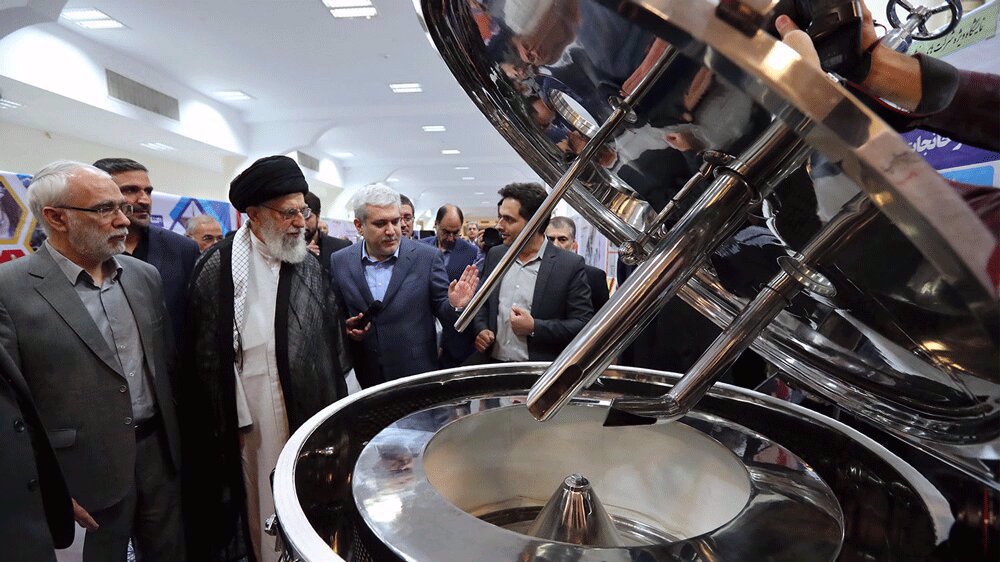
For now, reports from the negotiations among the remaining signatories of the 2015 nuclear deal are fluid, swinging constantly between upbeat and doubtful.
While the Biden administration has declared its predecessor's policy of abandoning the agreement as wrong, its apparent strategy is to open a door for negotiation with Iran for new demands and at the same time maintain the core elements of pressure on the country intact.
US Secretary of State Antony Blinken said earlier this month that he expected hundreds of US sanctions on Tehran to remain in place even if the United States returned to compliance with the nuclear deal.
"I would anticipate that even in the event of a return to compliance with the JCPOA, hundreds of sanctions will remain in place, including sanctions imposed by the Trump administration," Blinken told a Senate committee, referring to the Joint Comprehensive Plan of Action, as the nuclear deal is officially called.
At home, however, the advocates of the Iran nuclear agreement have been unusually optimistic.
“The sanctions will be removed soon and foreign investment will flow into Iran,” President Hassan Rouhani said last Monday.
This is while the much vaunted nuclear deal utterly failed to open the floodgates of foreign investment during the honeymoon period between July 2015 when it burst into existence and May 2018 when former president Donald Trump pulled the US out of the agreement.
Biden has said he is ready to return to the nuclear pact, but with distrust of the US running deep in Iran, Tehran insists that Washington must act first to remove all the sanctions imposed, reimposed and relabeled under Trump.
The Islamic Republic is aware of the US game. Biden has indicated that he would use the revival of the nuclear deal as a springboard to a broader agreement that would restrict Iran’s missile program and regional role.
While the United States is facing an impossible mission against the new Iranian administration to expand the scope of the accord, expectations from a likely agreement are equally subdued.
“The likely outcome for the JCPOA negotiations is a return to the 2015 agreement, which would keep many sanctions in place. Such a limited agreement would deter significant investment by Western firms, making a sharp pickup in growth unlikely,” the Institute of International Finance (IIF) said in a new report.
According to the Washington-based trade association, whose members include over 400 banks and financial institutions across the globe, Iran’s real GDP could grow by 3.5% this year, and by 4.1% and 3.8% in 2022 and 2023 respectively.
“The modest recovery may not reduce unemployment significantly, which currently hovers around 20%,” it said.
If the sides fail to reach any agreement, unemployment in Iran will likely remain in double digits and economic growth will be subdued, at 1.8% this year, it added.
Resistance economy
Despite the rapid evaporation of expected benefits from the long JCPOA process, a certain illusion remains that a general "normalization" with the outside powers might still bring economic benefits to the country.
But after years of experience with the false promises of global economic liberalism, the prevailing idea is that the better economic opportunities for Iran's economic growth lie in a resistance economy, which builds an economically integrated regional bloc.
As defined by Leader of the Islamic Revolution Ayatollah Seyyed Ali Khamenei, it is an economy that weans itself off oil exports, seeks to safeguard domestic industries from foreign intrigues and eschews trade in favor of local markets.
Should Iran do so, it can “immunize the country so that we will no longer tremble in face of sanctions and the possibility of sanctions," the Leader has said.
Sanctions have already stimulated Iran’s industrial development, insofar as they kept foreign competition at bay, enabling the country to become something of an industrial powerhouse in the region.
The country’s industrial development, whilst targeted and threatened due to numerous sanctions, has included eliminating imports of steel and fuel.
The US-based International Trade Administration recognized that between 2015 and 2018, Iran had moved from a net importer of steel into one of the world’s top 20 steel exporters. Steel production averaged more than 2 million tons per month from October 2018 to June 2019 or 25 million tons per year.
Iran ranked the world’s 10th largest steel producer in the first five months of 2021, Tehran Times reported on Tuesday, citing data by the World Steel Association (WSA).
The country produced 12.5 million tons of crude steel in January-May 2021, up 9.2 percent against the corresponding period in 2020. Steel output, the report said, stood at 2.6 million tons in May, up 7.7 percent year on year.
Today, Iran no longer exports crude oil to import fuel, because its expanded refinery capacity has ensured national fuel self-sufficiency. The country’s mobile telephone and computer hardware sector is also well advanced.
Motor vehicle production, including export production, has grown strongly and will grow more since the time when US third party sanctions forced French automakers such as Renault, Peugeot and Citroen to withdraw.
Iran’s motor vehicle market has been described as a “consolidated market with strong growth prospects”. Meanwhile, Iran has been reverse engineering foreign built tunneling machines and pharmaceuticals.
Barakat pharmaceutical town which opened in 2018 employs 7,000 and indirectly another 30,000.
It has developed the country's first homegrown vaccine, COVIran Barakat, against the COVID-19 pandemic, which Ayatollah Khamenei received last week. In many of these cases, an export potential has been built.


No comments:
Post a Comment